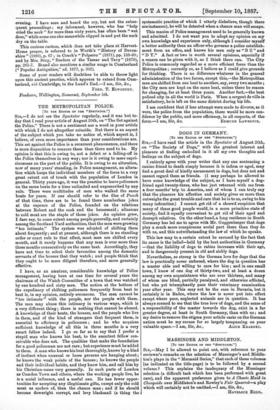THE METROPOLITAN POLICE.
[TO TER EDITOR Or TES .•BracrLrox."] Sla,—I do not see the Spectator regularly, and it was but to. day that I read your article of August 20th, on "The Set against the Police." There is not a sentiment nor a word in your article with which I do not altogether coincide. But there is an aspect of the subject which you take no notice of, which aspect is, I believe, of even more importance than your considerations are. This set against the Police is a recurrent phenomenon, and there is more disposition to censure them than there used to be. My opinion is that this is owing to, not a defect or a falling-off in the Police themselves in any way; nor is it owing to mere capri- ciousness on the part of the public. It is owing to an alteration, now of many years' standing, in Police management, an alters, tion which keeps the individual members of the force to a very great extent out of touch with the population of London in general. Thirty years ago, it was the practice to leave policemen on the same beats for a time unlimited and unprescribed by any rale. There were multitudes of men who walked the same beats for years. If one should refer to the files of Punch. of that time, there are to be found there numberless jokes at the expense of the Police, founded on the relations between Robert and the cook and the housemaid ; allusions to cold meat are the staple of those jokes. An opinion grew, I dare say, to some extent among people generally, and certainly among the Scotland Yard authorities, that the men were growing "too intimate." The system was adopted of shifting them about frequently; and at present, although there is no standing order or exact rule to that effect, most men are shifted every month, and it rarely happens that any man is ever more than three months consecutively on the same beat. Accordingly, they have not time to select their favourites among the domestic servants of the houses that they watch ; and people think that they ought to be more diligent therefore, and more generally effective.
I have, as an amateur, considerable knowledge of Police management, having been at one time for several years the chairman of the Watch Committee of a town that was watched by one hundred and sixty men. The notion at the bottom of the expediency of shifting policemen frequently from beat to beat is, in my opinion, entirely erroneous. The men cannot be "too intimate" with the people, nor the people with them. The men may abuse this intimacy in various ways, which is a very different thing ; there is nothing that cannot be abused. A knowledge of their beats, the houses, and the people who live in them, and of the kind of strangers that frequent them, is essential to efficiency in policemen ; and he who acquires sufficient knowledge of all this in three months is a very smart fellow indeed. I go so far as to say that I prefer a stupid man who knows his beat, to the smartest fellow con- ceivable who does not. The qualities that make the foundation for a good policeman are not rare ; but experience must be'added to them. A man who knows his beat thoroughly,knows by a kind of instinct when unusual or loose persons are hanging about; he knows the weak points of the houses ; he knows the people and their individual habits, and they know him, and call him by his Christian-name very generally. In such parte of London as Camden Town and others, where the working people live, he is a social influence, and a useful one. He has fewer oppor- tunities for accepting any illegitimate gifts, except only the cold meat as spoken of, than the chance man ; and if he should become downright corrupt, and levy blackmail (a thing the systematic practice of which I utterly disbelieve, though there are instances), he will be detected when a chance man will escape.
This maxim of Police management used to be generally known and admitted. I do not want you to adopt my opinion on my own knowledge and experience only, although I consider myself a better authority than an officer who governs a police establish- ment from an office, and knows his men only as "B Z " and " D Y." A faot or two is worth several opinions, especially if a reason can be given with it, as I think there can. The City Police is commonly regarded as a more efficient force than the Metropolitan ; correctly so, as I believe as I could give grounds for thinking. There is no difference whatever in the general administration of the two forces, except this,—the Metropolitan men are shifted from one beat to another, say, every two months ; the City men are kept on the same beat, unless there be reason for changing, for at least three years. Another fact,—the best policed city in all the world is Paris. When a eergent de villa is satisfactory, he is left on the same district during hip life.
I am confident that if lees attempt were made to divorce, as it were, the police from the population, there would be more con- fidence by the public, and more efficiency, in all respects, of the


































 Previous page
Previous page